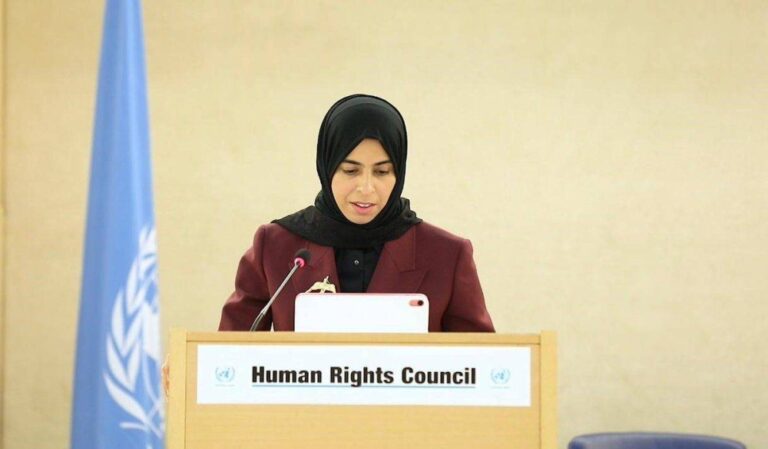A threat of extermination is looming over hundreds of thousands of children in Rafah, in southern Gaza Strip, while thousands in the northern enclave are starving to death, Qatar warned on Tuesday, urging the United Nations Human Rights Council (HRC) to stand firmly and strongly against the blatant international humanitarian law violations and collective punishment of civilian Palestinians.
Minister of State for International Cooperation at the Ministry of Foreign Affairs HE Lolwah bint Rashid Al Khater made the call before the High-Level Segment of the 55th Session of the Human Rights Council in Geneva, where she warned that Palestinians are living hell on Earth under an apartheid regime well before October 7.
Highlighting the UN Security Council’s failure to pass a cease-fire resolution, the 45th in its modern history and the third since October 7, Khater called for an immediate ceasefire and for the hostilities against Gaza to stop.
All resolutions that were adopted, including Resolution 2720, which demands unimpeded humanitarian aid delivery to civilians in Gaza, were largely ignored by Israel, she said, wondering whether human rights principles are applied to everyone as the world marks the 75th anniversary of the Universal Declaration of Human Rights. She highlighted the mounting condemnation worldwide for applying human rights principles to some peoples while depriving others, which means that some people are seen as deserving of protection, freedom and self-determination, but others are not.
Highlighting the large-scale deaths associated with catastrophic conditions, tragic facts and indelible horrific images, Khater lambasted what is happening in Gaza as a genocidal war, pointing to Palestinian child named Darien, who lost over 50 family members in an Israeli air strike, and another child, Ahmed, who lost a coveted dream to be a human rights activist as he observed the world around him falling apart.
She red-flagged the rapidly deteriorating situation in the West Bank at a time when the world is focusing on Gaza, saying that civilians in the West Ban suffered their deadliest year in 2023, even before October 7, with Israel intensifying its military offensives, killing nearly 400 people and expanding its illegal settlements, resulting in the forcible displacement of over 3,300 people last year and the demolition of more than 1,000 buildings.
She reiterated Qatar’s condemnation of Israel’s storming of the Al-Aqsa Mosque and attacks on worshipers, which have escalated over the past years, especially in the Holy Month of Ramadan, slamming these heinous acts of violence as provocations to more than two billion Muslims worldwide, and a flagrant violation of the international law.
Khater called for addressing a range of grave humanitarian crises around the world including the killing of nearly 14,000 people and the displacement of over eight million people in Sudan – a crisis that triggered widespread violence, atrocities and mass displacement, which particularly affected women, with over four million women fearing gender-based violence. The Sudan crisis underscores the urgent need for an orchestrated international response and an immediate political solution to stop further destabilisation inside the country and beyond, she added.
Commenting on the crisis in Syria, she renewed Qatar’s calls for united efforts to address the world’s largest displacement challenge with over 12 million Syrians forced out of their homes.
She also addressed the ongoing violations and atrocities against the Rohingya, with over a million refugees ballooned in cramped camps, and more than 600,000 still fearing persecution in the Rakhine region.
She reiterated Qatar’s keenness to continue cooperation with the HRC, expressing Qatar’s aspirations to extend its HRC membership for the period from 2025-2027, and stressing at the same time Qatar’s unwavering support and protection of human rights for all.
QNA



